.
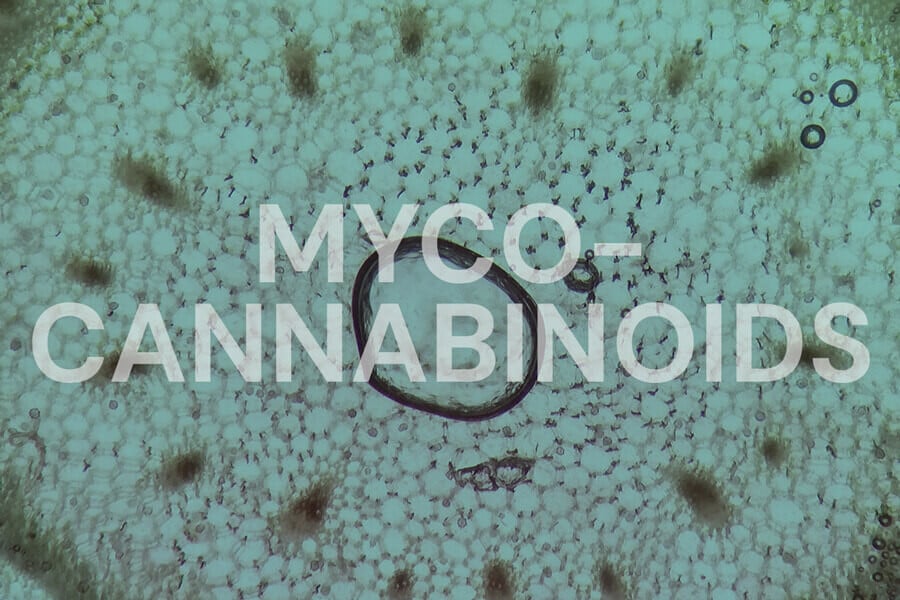
Mycocannabinoids: Can Mushrooms Target the Endocannabinoid System?
Cannabis plants produce over 100 cannabinoids. Likewise, a variety of common herbs and spices also produce compounds capable of influencing the human endocannabinoid system. But recent research takes things a step further; cannabinoids also show up outside of the plant kingdom, in mushrooms! Discover what we know about mycocannabinoids so far.
Contents:
Mushrooms and cannabis have an inherent association in the minds of many. Certain species of fungi, much like weed, have a psychoactive effect, influencing the brain in unique and profound ways. Likewise, scientists continue to assess both cannabis and several types of mushrooms for their therapeutic potential. Despite these broad similarities, recent studies show that mushrooms and cannabis may share a chemical bridge that brings these two kingdoms of life closer together than previously imagined. That is, both contain components that influence the human endocannabinoid system—a signalling network responsible for keeping pretty much everything in our body balanced and running smoothly. Welcome to the world of mycocannabinoids!
An Introduction to Mycocannabinoids
To understand what mycocannabinoids are, we first need to consider the definition of cannabinoids in general.
Upon confirming the structure of CBD and isolating THC, the legendary cannabis scientist Dr Raphael Mechoulam defined[1] cannabinoids as a “group of C21 compounds typical of and present in Cannabis sativa, their carboxylic acids, analogs, and transformation products”.
The very name of this chemical class indicates that cannabinoids certainly occur in cannabis plants. However, their definition[2] has since expanded to include molecules found in a wider range of plant species that either share chemical similarity with weed-derived cannabinoids or are capable of directly interacting with receptors of the endocannabinoid system. Termed “phytocannabinoids” (“phyto” referring to plants), these compounds activate CB1 and/or CB2 receptors in a similar way to THC and related molecules found in marijuana.


More recently, researchers have discovered compounds in several species of fungi that are also capable of binding to endocannabinoid system receptors. However, as they derive from a completely different kingdom of life, these novel molecules fall outside of the definition of phytocannabinoids. Much like plant-derived cannabinoids, mycocannabinoids directly influence the endocannabinoid system, yet their presence in fungi points towards a potentially massive reservoir of undiscovered cannabinoids in nature. Indeed, while only a fraction have been recognized and named, studies estimated that over[3] 600,000 species of fungi exist.
Cannabinoids Aren’t Just in Cannabis
As we’ve established, cannabinoids aren’t exclusive to cannabis. Before we showcase the known mycocannabinoids, let’s take a look at other plants that produce these fascinating compounds:
- Broccoli: Alongside other members of the Brassica genus, broccoli produces a dietary indole known as DIM[4] that partially activates the CB2 receptor.
- Kava: Traditionally consumed as a drink in Polynesia to induce a relaxing state, the kava plant contains the yangonin[5] molecule that activates the CB1 receptor—the same site triggered by THC.
- Carrots: This common vegetable also contains a CB1 receptor agonist known as falcarinol.
- Black pepper: Alongside cloves, rosemary, and other herbs and spices, this common condiment contains the terpene and cannabinoid beta-caryophyllene, which acts directly on the CB2 receptor.
Mushrooms vs Plants: An Important Distinction
So, cannabinoids don’t just occur in weed; they’re also found in other plants and even in fungi. Before we delve into the mycocannabinoids science has discovered so far, it’s important to take a second to really appreciate mushrooms. Sure, we could just simply lump all cannabinoids under the same umbrella. However, as our understanding of the fungus kingdom continues to evolve, it’s paramount to give credit where it is due.
In the past, taxonomists grouped mushrooms and plants together. As understanding developed, they were placed into their own kingdom of life. Despite this, mushrooms have remained under the radar of mainstream interest until recently. Now, fungi are finally receiving more attention as we continue to learn about their critical role in ecosystems and agriculture, and what they can do for humanity as a whole.
However, fungi still have a long way to go to get the recognition they deserve. Because fungi represent just 0.2% of our global conservation priorities, groups such as the Fauna Flora Funga (FFF)[6] Initiative are working to build advocacy, drive research, and bring fungi deeper into the conservation conversation. Breakthroughs in fungi research, including the discovery of cannabinoids unique to this kingdom of life, help to garner interest and generate curiosity around fungal species that we don’t even know exist yet!
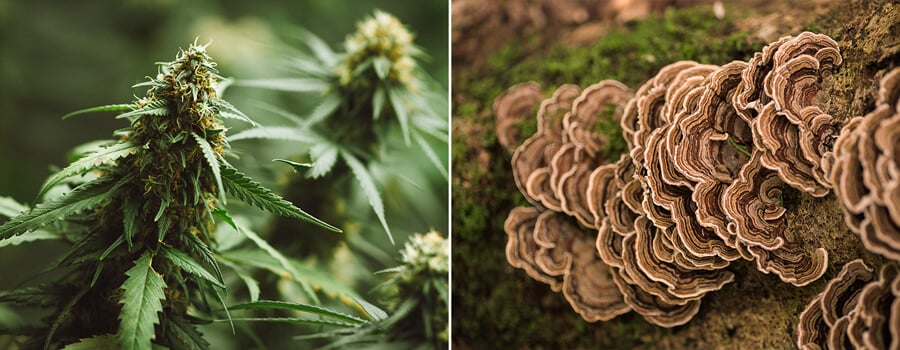
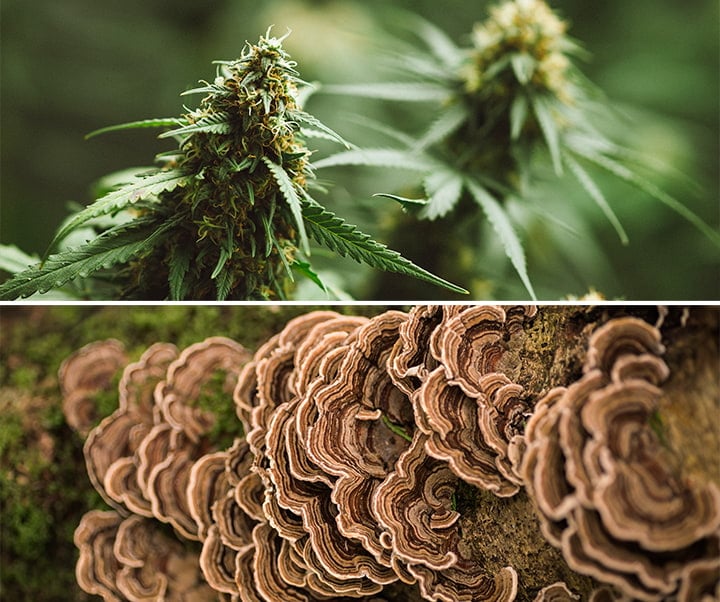
Medicinal Fungi: Do Mycocannabinoids Contribute to Their Benefits?
Out of the many known fungal species, humans have used a handful of medicinal mushrooms over thousands of years for their purported therapeutic action. These include adaptogens[7] that help to curtail tension, including the legendary reishi mushroom. In antiquity, physicians of the time attributed their effects to spiritual means; contemporary science understands that, when consumed, these fungi contain many different constituents that work in specific ways to impact our physiology. Now, it turns out that their influence on the endocannabinoid system could underpin some of their sought-after effects on the mind and body.
Which Medicinal Mushrooms Contain Mycocannabinoids?
Right then, let’s explore the three powerhouse mushrooms that are known to contain mycocannabinoids. You’re probably familiar with at least one of these species, and now you’ll see them in a whole new light!
Reishi
Also known by the traditional Chinese name lingzhi, several reishi species have been prized as a source of longevity in the East for millennia. Contemporary science shows that reishi contains a host of bioactive components, and it has been the subject of early research[8] focusing on tumours and bacterial and viral infections. Evidence also suggests it could help to modulate the immune system. When it comes to mycocannabinoids, a 2020 paper[9] published in the Journal of Ethnopharmacology identified a series of novel compounds in two reishi species. They found Ganoderma cochlear to contain three molecules that target both CB1 and CB2 receptors. Likewise, they found Ganoderma hainanense to produce a compound that blocks the CB1 receptor.
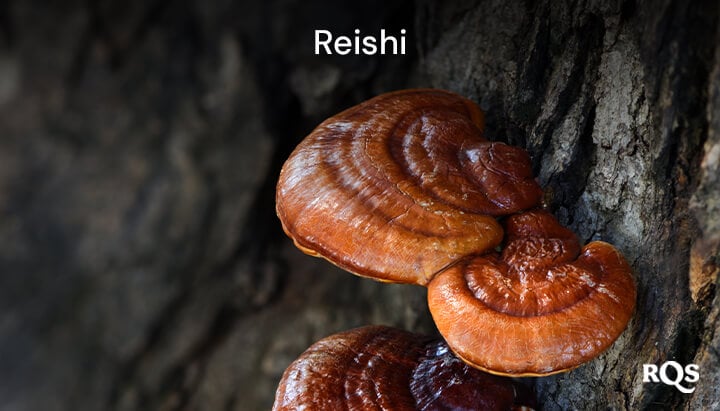
Cordyceps
Also known as “zombie mushrooms” for their ability to infect living insects, several species of the Cordyceps genus also have a long history of holistic use. Cordyceps sinensis, for example, has gained a heavy price tag for its purported ability to boost energy and endurance[10], promote longevity, and support the immune system. A variety of compounds are thought to underpin their effects, and it turns out cordyceps could also serve as a source of mycocannabinoids. By enhancing the ability of Cordyceps annulata to produce secondary metabolites, a research team from Japan discovered four new compounds, named annullatins[11], capable of binding to cannabinoid receptors. Annullatin A activated both CB1 and CB2 receptors, whereas annullatins B and D activated CB1 and reduced endocannabinoid system signalling when they bound to CB2.
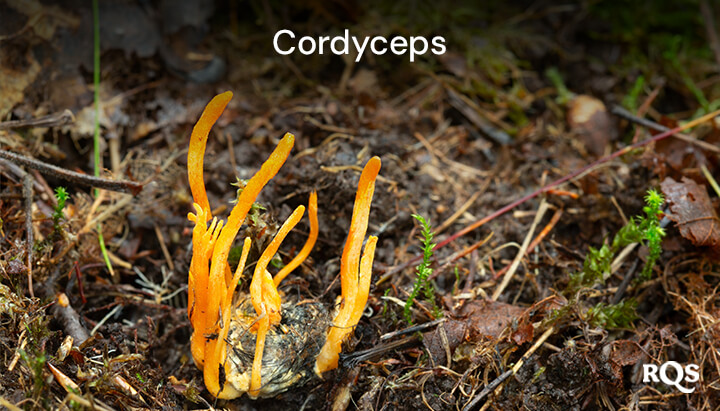
Turkey Tail
Turkey tail mushrooms grow abundantly in the forests of North America, Europe, and Asia, typically found on decaying hardwood logs and stumps. These mushrooms have risen to fame thanks to human trials[12] that have given scientific heft to their holistic potential. Out of all the constituents in the mushroom, polysaccharopeptide (PSP) has shown impressive potential in activating immune cells and inducing apoptosis[13] in cancer cells. Interestingly, a 2019 study[14] shows that this same molecule binds to the CB2 receptor, a site viewed as a novel target[15] in the treatment of some cancers.
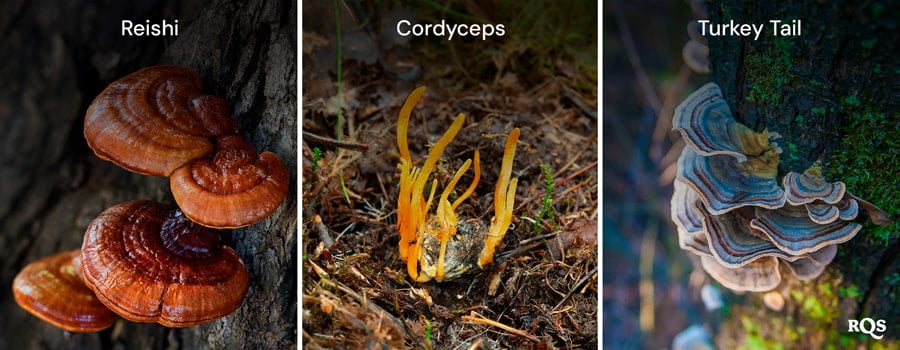
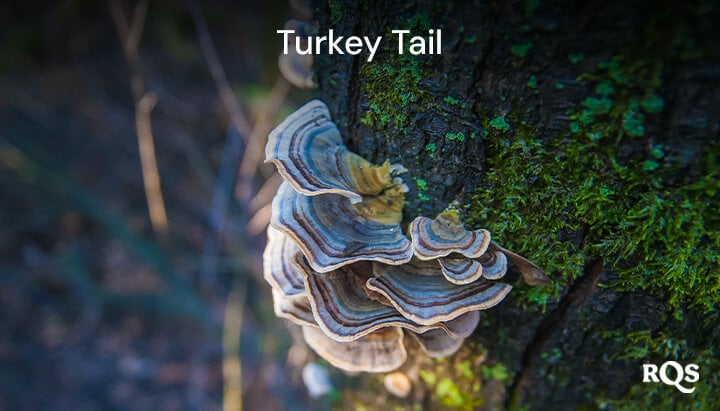
The Future of Mycocannabinoids in the World of Weed
Much like cannabis, mushrooms also contain cannabinoids that influence the endocannabinoid system. While extremely exciting, the findings above potentially represent just the tip of a massive iceberg. Considering the majority of mushroom species likely remain undiscovered, this kingdom of life could serve as a massive reservoir of novel compounds that bind to cannabinoid receptors, possibly providing holistic effects. On top of this, research surrounding the entourage effect indicates that cannabinoids and other cannabis constituents work together in a synergistic fashion. This suggests that, at some point in the future, we could see formulas that combine phytocannabinoids, mycocannabinoids, terpenes, and other components to achieve tailored, desirable outcomes. The future looks fungal!
- Cannabinoids: Definitional ambiguities and a proposal https://www.sciencedirect.com
- Download Cite Share Favorites Permissions Perspective A closer look at cannabimimetic terpenes, polyphenols, and flavonoids https://journals.lww.com
- State of the World's Plants and Fungi 2023 https://www.kew.org
- Lipid G protein-coupled receptor ligand identification using beta-arrestin PathHunter assay - PubMed https://pubmed.ncbi.nlm.nih.gov
- Beyond Cannabis: Plants and the Endocannabinoid System http://ethanrusso.org
- FFF – Fauna Flora Funga https://faunaflorafunga.org
- A current status of adaptogens: natural remedy to stress https://www.sciencedirect.com
- Ganoderma lucidum (Lingzhi or Reishi) - Herbal Medicine - NCBI Bookshelf https://www.ncbi.nlm.nih.gov
- Identification of novel phytocannabinoids from Ganoderma https://www.sciencedirect.com
- Rhodiola crenulata- and Cordyceps sinensis https://www.liebertpub.com
- Dihydrobenzofurans as cannabinoid receptor ligands from Cordyceps annullata https://www.sciencedirect.com
- FDA Approves Bastyr Turkey Tail Trial for Cancer Patients | Bastyr University https://bastyr.edu
- Identifying the mechanism of polysaccharopeptide against breast cancer https://bmccancer.biomedcentral.com
- Polysaccharopeptide from Trametes versicolor https://www.sciencedirect.com
- Overexpression of cannabinoid receptor https://onlinelibrary.wiley.com





































